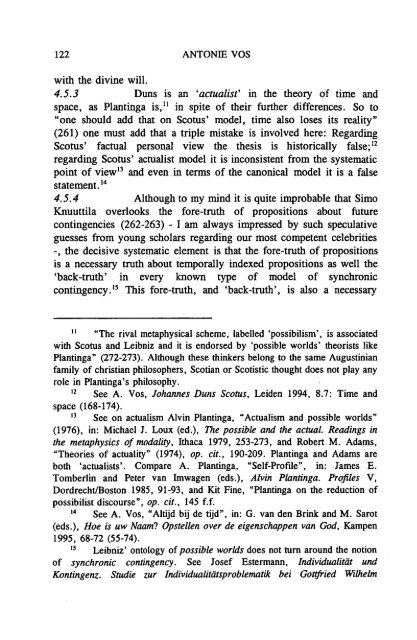Jaarboek Thomas Instituut 1997 - Thomas Instituut te Utrecht
Jaarboek Thomas Instituut 1997 - Thomas Instituut te Utrecht
Jaarboek Thomas Instituut 1997 - Thomas Instituut te Utrecht
You also want an ePaper? Increase the reach of your titles
YUMPU automatically turns print PDFs into web optimized ePapers that Google loves.
122 ANTONIE VOS<br />
with the divine will.<br />
4.5.3 Duns is an 'actualist' in the theory of time and<br />
space, as Plantinga is," in spi<strong>te</strong> of their further differences. So to<br />
"one should add that on Scotus' model, time also loses its reality"<br />
(261) one must add that a triple mistake is involved here: Regarding<br />
Scotus' factual personal view the thesis is historically false; 12<br />
regarding Scotus' actualist model it is inconsis<strong>te</strong>nt from the sys<strong>te</strong>matic<br />
point of view" and even. in <strong>te</strong>rms of the canonical model it is a false<br />
sta<strong>te</strong>ment. 14<br />
4.5.4 Although to my mind it is qui<strong>te</strong> improbable that Simo<br />
Knuuttila overlooks the fore-truth of propositions about future<br />
contingencies (262-263) - I am always impressed by such speculative<br />
guesses from young scholars regarding our most compe<strong>te</strong>nt celebrities<br />
-, the decisive sys<strong>te</strong>matic element is that the fore-truth of propositions<br />
is a necessary truth about <strong>te</strong>mporally indexed propositions as well the<br />
'back-truth' in every known type of model of synchronic<br />
contingency. IS This fore-truth, and 'back-truth', is also a necessary<br />
II "The rival metaphysical scheme, labelled 'possibilism', is associa<strong>te</strong>d<br />
with Scotus and Leibniz and it is endorsed by 'possible worlds' theorists like<br />
Plantinga" (272-273). Although these thinkers belong to the same Augustinian<br />
family of christian philosophers, Scotian or Scotistic thought does not play any<br />
role in Plantinga's philosophy.<br />
12 See A. Vos, JohannesDuns Scotus, Leiden 1994, 8.7: Time and<br />
space (168-174).<br />
13 See on actualism Alvin Plantinga, "Actualism and possible worlds"<br />
(1976), in: Michael J. Loux (ed.), The possible and the actual. Readingsin<br />
the metaphysicsof modality, Ithaca 1979, 253-273, and Robert. M. Adams,<br />
"Theories of actuality" (1974), op. cit., 190-209. Plantinga and Adams are<br />
both 'actualists'. Compare A. Plantinga, "Self-Profile", in: James E.<br />
Tomberlin and Pe<strong>te</strong>r van Imwagen (eds.), Alvin Plantinga. Profiles V,<br />
DordrechtIBoston 1985, 91-93, and Kit Fine, "Plantinga on the reduction of<br />
possibilist discourse", op. cit., 145 f.f.<br />
14 See A. Vos, "Altijd bij de tijd", in: G. van den Brink and M. Sarot<br />
(eds.), Hoe is uw Naam?Ops<strong>te</strong>llenover de eigenschappenvan God, Kampen<br />
1995, 68-72 (55-74).<br />
IS Leibniz' ontology of possible worldsdoes not turn around the notion<br />
of synchronic contingency. See Josef Es<strong>te</strong>rmann, Individualitiit und<br />
Kontingenz. Studie zur Individualitatsproblematikbei Gottfried Wilhelm








